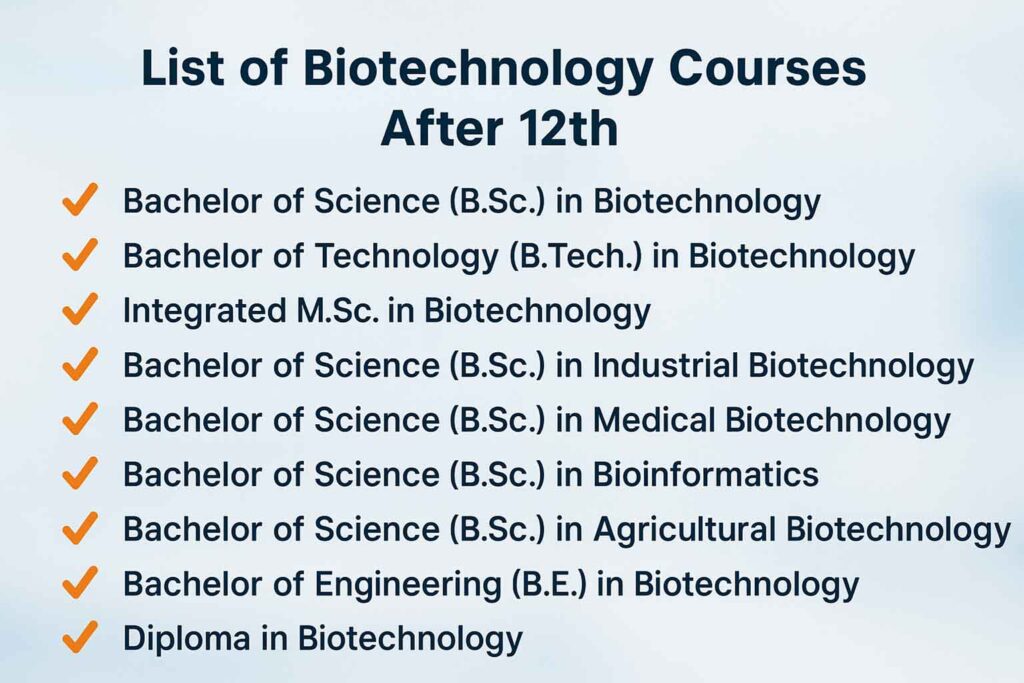Have you ever wondered how we can engineer crops to withstand diseases, develop groundbreaking medicines, or even utilize tiny microorganisms to clean up pollution? This fascinating world of innovation is precisely what biotechnology offers! If you’ve just completed your 12th standard and are passionate about science, keen on solving real-world problems, and eager to contribute to advancements that impact humanity, then exploring biotechnology courses after 12th might be your perfect next step. Welcome to CoursesAfter.com, your guide to navigating the exciting and diverse landscape of higher education, especially in the promising field of biotechnology.
Biotechnology is a rapidly expanding interdisciplinary field that merges biology with technology to develop new products and solutions. It’s at the forefront of breakthroughs in medicine, agriculture, environmental science, and industrial processes. Choosing a career in this dynamic sector means you’ll be part of shaping the future. But with so many options available after 12th, how do you decide which biotechnology course is best for you? Let’s dive in and explore.
After 12th, which Biotechnology Course is best?
The “best” biotechnology course after 12th truly depends on your individual interests, career aspirations, and aptitude. Do you envision yourself in a research lab, designing new drugs? Or perhaps you’re more drawn to the industrial application of biotechnology, such as developing biofuels or improving food production processes? Generally, the most popular and comprehensive options for students after 12th with a science background (preferably PCB or PCMB) are Bachelor of Science (B.Sc) in Biotechnology and Bachelor of Technology (B.Tech.) in Biotechnology.
B.Sc. Biotechnology focuses more on the theoretical and foundational aspects of biological sciences, including genetics, molecular biology, microbiology, and biochemistry. It’s an excellent stepping stone for those interested in research, higher studies (M.Sc., Ph.D.), or roles in quality control and lab analysis.
B.Tech. Biotechnology, on the other hand, integrates engineering principles with biological sciences. This program is more application-oriented, preparing students for roles in bioprocess engineering, biomanufacturing, and product development within industries. If you enjoy problem-solving through a technical lens, B.Tech. might be a better fit.
Beyond these two primary degrees, several other specialized courses cater to specific niches within biotechnology. The best course is the one that aligns with your passion and long-term career goals.
List of Biotechnology Courses After 12th

Here’s a list of 15 popular biotechnology courses you can pursue after completing your 12th standard, detailing their duration, eligibility, career options, fees, and potential salary ranges. Please note that fees and salaries can vary significantly based on the institution, location, and individual skill set.
Bachelor of Science (B.Sc.) in Biotechnology
- Duration: 3 years
- Eligibility: 12th pass with Science stream (Physics, Chemistry, Biology/Mathematics)
- Career Options: Research Assistant, Lab Technician, Quality Control Analyst, Biotechnologist, Scientific Writer, Clinical Research Associate, pursue M.Sc. and Ph.D.
- Fees: ₹30,000 to ₹3,00,000 per annum
- Salary Range: ₹2.5 to 5 LPA (starting)
Bachelor of Technology (B.Tech.) in Biotechnology
- Duration: 4 years
- Eligibility: 12th pass with Physics, Chemistry, and Mathematics/Biology
- Career Options: Bioprocess Engineer, R&D Scientist, Biomedical Engineer, Production Manager, Bioinformatics Analyst, Environmental Biotechnologist
- Fees: ₹1,00,000 to ₹8,00,000 per annum
- Salary Range: ₹3 to 6 LPA (starting)
Integrated M.Sc. in Biotechnology
- Duration: 5 years (combines B.Sc. and M.Sc.)
- Eligibility: 12th pass with Science stream (Physics, Chemistry, Biology/Mathematics)
- Career Options: Research Scientist, Lecturer, Senior Lab Analyst, opportunities for advanced research and academia
- Fees: ₹50,000 to ₹3,00,000 per annum
- Salary Range: ₹4 to 7 LPA (starting)
Bachelor of Science (B.Sc.) in Industrial Biotechnology
- Duration: 3 years
- Eligibility: 12th pass with Science stream (Physics, Chemistry, Biology/Mathematics)
- Career Options: Fermentation Scientist, Biofuel Production Engineer, Enzyme Technologist, Biomanufacturing Specialist
- Fees: ₹40,000 to ₹2,50,000 per annum
- Salary Range: ₹2.8 to 5.5 LPA (starting)
Bachelor of Science (B.Sc.) in Medical Biotechnology
- Duration: 3 years
- Eligibility: 12th pass with Science stream (Physics, Chemistry, Biology)
- Career Options: Medical Lab Technologist, Pharmaceutical Research Assistant, Diagnostic Product Developer, Clinical Trials Coordinator
- Fees: ₹50,000 to ₹3,50,000 per annum
- Salary Range: ₹3 to 6 LPA (starting)
Bachelor of Science (B.Sc.) in Bioinformatics
- Duration: 3 years
- Eligibility: 12th pass with Science stream (Physics, Chemistry, Biology/Mathematics)
- Career Options: Bioinformatics Analyst, Data Scientist (Biology), Computational Biologist, Gene Sequencer
- Fees: ₹40,000 to ₹2,80,000 per annum
- Salary Range: ₹3.5 to 7 LPA (starting)
Bachelor of Science (B.Sc.) in Agricultural Biotechnology
- Duration: 3 years
- Eligibility: 12th pass with Science stream (Physics, Chemistry, Biology)
- Career Options: Plant Biotechnologist, Agricultural Researcher, Crop Development Scientist, Soil Health Analyst
- Fees: ₹30,000 to ₹2,00,000 per annum
- Salary Range: ₹2.5 to 5 LPA (starting)
Bachelor of Engineering (B.E.) in Biotechnology
- Duration: 4 years
- Eligibility: 12th pass with Physics, Chemistry, and Mathematics/Biology
- Career Options: Similar to B.Tech., with a stronger emphasis on engineering design and application
- Fees: ₹1,00,000 to ₹7,00,000 per annum
- Salary Range: ₹3 to 6 LPA (starting)
Bachelor of Technology (B.Tech.) in Biomedical Engineering
- Duration: 4 years
- Eligibility: 12th pass with Physics, Chemistry, and Mathematics/Biology
- Career Options: Biomedical Engineer, Medical Device Developer, Clinical Engineer, Research Scientist in Healthcare
- Fees: ₹1,20,000 to ₹8,50,000 per annum
- Salary Range: ₹3.5 to 7 LPA (starting)
Bachelor of Technology (B.Tech.) in Food Technology (with Biotechnology focus)
- Duration: 4 years
- Eligibility: 12th pass with Physics, Chemistry, and Mathematics/Biology
- Career Options: Food Technologist, Quality Assurance in Food Industry, Product Development Scientist, Food Safety Officer
- Fees: ₹80,000 to ₹6,00,000 per annum
- Salary Range: ₹2.5 to 5.5 LPA (starting)
Diploma in Biotechnology
- Duration: 1–2 years
- Eligibility: 12th pass with Science stream
- Career Options: Lab Assistant, Production Assistant, Quality Control Technician, Research Support Staff
- Fees: ₹50,000 to ₹2,00,000 per annum
- Salary Range: ₹1.8 to 3.5 LPA (starting)
Diploma in Medical Laboratory Technology (DMLT) with a focus on Biotechnology
- Duration: 2–3 years
- Eligibility: 12th pass with Science stream (Physics, Chemistry, Biology)
- Career Options: Medical Lab Technologist, Clinical Diagnostic Technician, Blood Bank Technician
- Fees: ₹30,000 to ₹1,50,000 per annum
- Salary Range: ₹1.5 to 3 LPA (starting)
Certificate in Genetic Engineering
- Duration: 6 months to 1 year
- Eligibility: 12th pass with Science stream (beneficial with a basic science degree)
- Career Options: Research Assistant, Lab Technician specializing in genetic manipulation
- Fees: ₹15,000 to ₹75,000
- Salary Range: ₹1.5 to 3 LPA (starting; often requires further education for higher roles)
Certificate in Pharmaceutical Biotechnology
- Duration: 6 months to 1 year
- Eligibility: 12th pass with Science stream (beneficial with a basic science degree)
- Career Options: Pharmaceutical Lab Assistant, Production Support in Pharma, Quality Control in Drug Manufacturing
- Fees: ₹20,000 to ₹80,000
- Salary Range: ₹1.8 to 3.5 LPA (starting; often requires further education for higher roles)
Certificate in Biostatistics
- Duration: 6 months to 1 year
- Eligibility: 12th pass with Science stream (Mathematics background is an advantage)
- Career Options: Data Entry Specialist in Clinical Research, Assistant Biostatistician (requires further education for advanced roles)
- Fees: ₹10,000 to ₹60,000
- Salary Range: ₹1.5 to 3 LPA (starting; often requires further education for higher roles)
Biotechnology Courses After 12th with fees
Understanding the financial commitment is crucial when choosing a course. Here’s a table summarizing popular biotechnology courses after the 12th, along with their approximate annual fees. These figures are indicative and can vary based on the institution’s type (government/private), reputation, facilities, and location.
| Course Name | Average Annual Fees (INR) |
| B.Sc. Biotechnology | ₹30,000 – ₹3,00,000 |
| B.Tech. Biotechnology | ₹1,00,000 – ₹8,00,000 |
| Integrated M.Sc. in Biotechnology | ₹50,000 – ₹3,00,000 |
| B.Sc. in Industrial Biotechnology | ₹40,000 – ₹2,50,000 |
| B.Sc. in Medical Biotechnology | ₹50,000 – ₹3,50,000 |
| B.Sc. in Bioinformatics | ₹40,000 – ₹2,80,000 |
| B.Sc. in Agricultural Biotechnology | ₹30,000 – ₹2,00,000 |
| B.E. in Biotechnology | ₹1,00,000 – ₹7,00,000 |
| B.Tech. in Biomedical Engineering | ₹1,20,000 – ₹8,50,000 |
| B.Tech. in Food Technology | ₹80,000 – ₹6,00,000 |
| Diploma in Biotechnology | ₹50,000 – ₹2,00,000 |
| Diploma in Medical Laboratory Technology | ₹30,000 – ₹1,50,000 |
| Certificate in Genetic Engineering | ₹15,000 – ₹75,000 |
| Certificate in Pharmaceutical Biotechnology | ₹20,000 – ₹80,000 |
| Certificate in Biostatistics | ₹10,000 – ₹60,000 |
Top Biotechnology Courses After 12th with Salary
A significant factor in choosing a career path is the earning potential. While starting salaries can be modest, the biotechnology sector offers substantial growth as you gain experience and specialize. Here’s a table outlining the typical starting salary ranges for various biotechnology courses after 12th:
| Course Name | Average Starting Salary Range (INR per annum) |
| B.Sc. Biotechnology | ₹2.5 – ₹5 LPA |
| B.Tech. Biotechnology | ₹3 – ₹6 LPA |
| Integrated M.Sc. in Biotechnology | ₹4 – ₹7 LPA |
| B.Sc. in Industrial Biotechnology | ₹2.8 – ₹5.5 LPA |
| B.Sc. in Medical Biotechnology | ₹3 – ₹6 LPA |
| B.Sc. in Bioinformatics | ₹3.5 – ₹7 LPA |
| B.Sc. in Agricultural Biotechnology | ₹2.5 – ₹5 LPA |
| B.E. in Biotechnology | ₹3 – ₹6 LPA |
| B.Tech. in Biomedical Engineering | ₹3.5 – ₹7 LPA |
| B.Tech. in Food Technology | ₹2.5 – ₹5.5 LPA |
| Diploma in Biotechnology | ₹1.8 – ₹3.5 LPA |
| Diploma in Medical Laboratory Technology | ₹1.5 – ₹3 LPA |
| Certificate in Genetic Engineering | ₹1.5 – ₹3 LPA |
| Certificate in Pharmaceutical Biotechnology | ₹1.8 – ₹3.5 LPA |
| Certificate in Biostatistics | ₹1.5 – ₹3 LPA |
It’s important to remember that these are entry-level salaries. With 3-5 years of experience, professionals in the biotech field, especially those with higher education (M.Sc. or Ph.D.), can often earn between ₹7 LPA and ₹15 LPA or even higher, depending on their specialization, role, and the organization.
6 Months Biotechnology Courses After 12th
For those looking for shorter, more focused programs to gain specific skills or explore the field before committing to a longer degree, several certificate courses are available. These 6-month biotechnology courses after 12th often provide practical knowledge and can be a good stepping stone into the industry. While direct career options immediately after these courses might be limited to entry-level support roles, they offer valuable foundational knowledge.
| Course Name | Average Fees (INR) | Average Starting Salary Range (INR per annum) |
| Certificate in Genetic Engineering | ₹15,000 – ₹75,000 | ₹1.5 – ₹3 LPA |
| Certificate in Pharmaceutical Biotechnology | ₹20,000 – ₹80,000 | ₹1.8 – ₹3.5 LPA |
| Certificate in Biostatistics | ₹10,000 – ₹60,000 | ₹1.5 – ₹3 LPA |
| Certificate in Clinical Research | ₹25,000 – ₹1,00,000 | ₹2 – ₹4 LPA |
| Certificate in Bioinformatics | ₹20,000 – ₹90,000 | ₹1.8 – ₹3.8 LPA |
| Certificate in Molecular Diagnostics | ₹18,000 – ₹70,000 | ₹1.5 – ₹3.2 LPA |
| Certificate in Food Biotechnology | ₹15,000 – ₹65,000 | ₹1.5 – ₹3 LPA |
These certificate courses are often designed to provide hands-on training in specific techniques and software, making graduates suitable for lab support, quality assurance, or data entry roles. Many students opt for these certificates to enhance their resumes while pursuing a full-time degree or to gain specialized skills for career advancement.
Top Biotechnology Colleges & Institutes in India
Choosing the right institution is just as important as choosing the right course. India boasts several reputable colleges and universities offering excellent biotechnology programs. These institutions often have state-of-the-art laboratories, experienced faculty, and strong industry connections, which can significantly enhance your learning experience and career prospects. Here’s a list of some of the top biotechnology colleges and institutes in India, generally ranked by their academic reputation and industry recognition:
- Indian Institutes of Technology (IITs) (e.g., IIT Delhi, IIT Bombay, IIT Kharagpur, IIT Madras, IIT Roorkee)
- All India Institute of Medical Sciences (AIIMS), Delhi
- Jawaharlal Nehru University (JNU), New Delhi
- University of Hyderabad (UoH), Hyderabad
- Banaras Hindu University (BHU), Varanasi
- Jamia Millia Islamia (JMI), New Delhi
- Vellore Institute of Technology (VIT), Vellore
- SRM Institute of Science and Technology (SRMIST), Chennai
- Manipal Academy of Higher Education (MAHE), Manipal
- Amity University, Noida
- Delhi University (Various colleges like Hansraj College, Miranda House, and Hindu College offer B.Sc. programs)
- Savitribai Phule Pune University (SPPU), Pune (formerly University of Pune)
- Institute of Chemical Technology (ICT), Mumbai
- Chandigarh University, Chandigarh
- Loyola College, Chennai
- The Oxford College of Science, Bangalore
- Kristu Jayanti College, Bangalore
- PSG College of Arts and Science (PSGCAS), Coimbatore
- St. Xavier’s College, Kolkata
- National Institute of Technology (NITs) (e.g., NIT Warangal, NIT Durgapur)
These institutions are known for their rigorous academic programs, research opportunities, and good placement records. Admission to many of these top colleges is often through competitive entrance examinations.
Conclusion
Embarking on a journey in biotechnology after the 12th opens up a world of innovation, discovery, and impact. Whether you choose a B.Sc. for its strong theoretical foundation, a B.Tech. for its engineering applications, or a specialized diploma or certificate, the field of biotechnology promises a dynamic and rewarding career. From developing life-saving drugs and enhancing agricultural yields to finding sustainable environmental solutions, biotechnologists are at the forefront of addressing some of humanity’s most pressing challenges.
As you consider your options, remember to align your course choice with your passions and long-term goals. Thoroughly research the curriculum, faculty expertise, and career services offered by different institutions. With the right education and dedication, a career in biotechnology can be incredibly fulfilling, allowing you to contribute meaningfully to scientific advancements and shape a better future for all. We hope this comprehensive guide on biotechnology courses after 12th helps you make an informed decision and sets you on a path to success!

